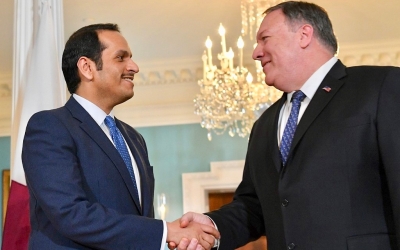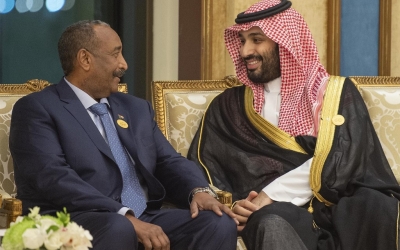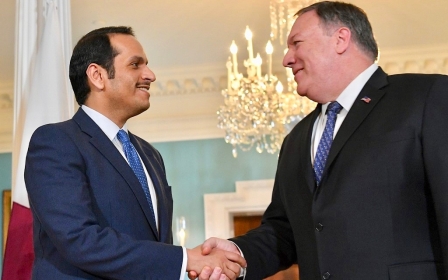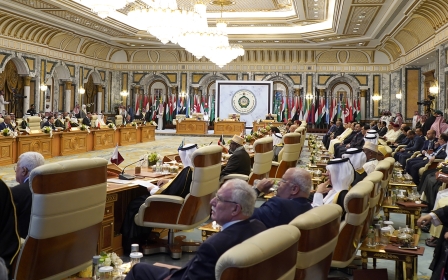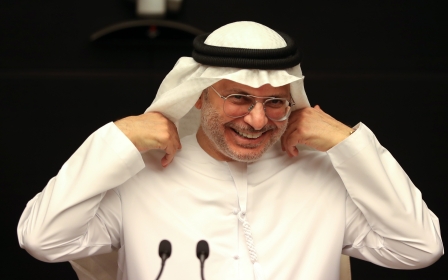Qatar foreign minister critical of Saudi, UAE effort to impose ‘stability’ on region
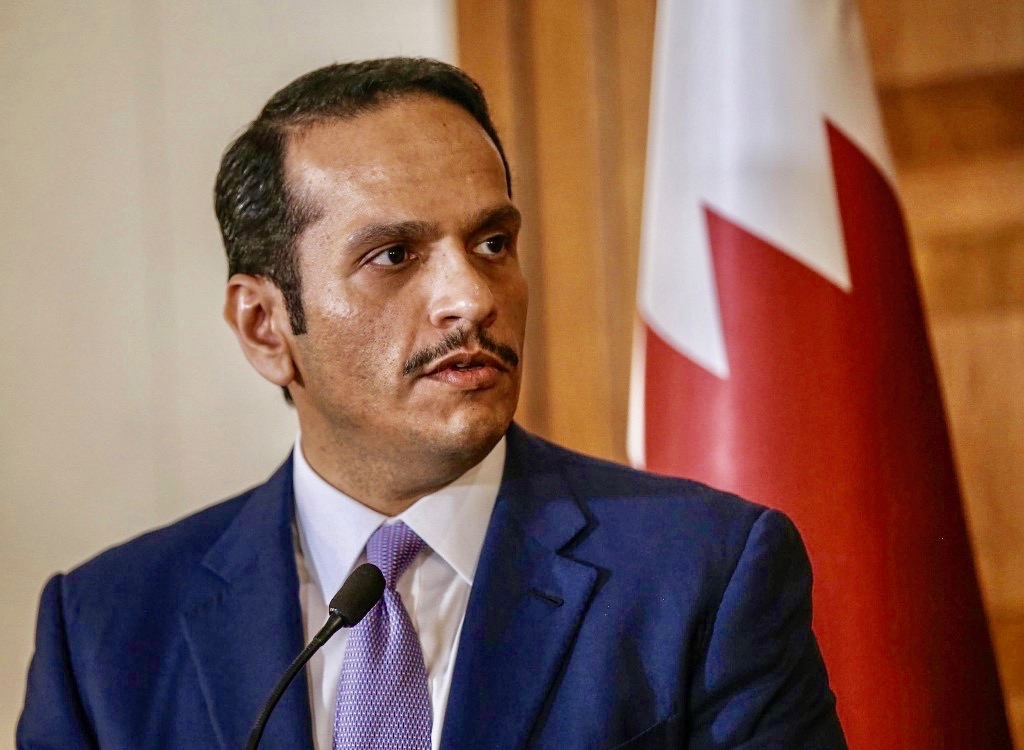
Qatar's foreign minister told reporters in London that a Saudi and Emirati plan to impose “stability” on the region by supporting authoritarian governments and military councils in Africa and throughout the Arab world was a recipe for chaos.
In a wide-ranging discussion on Sunday, Sheikh Mohammed bin Abdulrahman Al Thani said their narrative was creating more terrorism, conflict and chaos, and that “anyone who utters a contrary opinion is [in their view] a terrorist”.
He then questioned whether designating the Muslim Brotherhood as a terrorist group, which both countries have done and the United States promises to do, was either a “wise or pragmatic” decision.
“In Egypt, maybe there are five million Muslim Brotherhood members. Can you imagine, if 10 percent of them decided to be real terrorists, using violence? That would make 500,000.”
'We don’t want to see any confrontation between the two powers, US and Iran, because we are stuck in the middle'
- Sheikh Mohammed, Qatari foreign minister
While the Islamic State group counted on about 70,000 members, “we had a coalition of 64 countries to defeat them and they still are not defeated. Can we afford 500,000 more terrorists in the region? I do not think we can,” Sheikh Mohammed said.
New MEE newsletter: Jerusalem Dispatch
Sign up to get the latest insights and analysis on Israel-Palestine, alongside Turkey Unpacked and other MEE newsletters
He said Qatar has been the subject of efforts to demonise it by a quartet of Arab states, led by Saudi Arabia and the UAE, and that some countries had been blackmailed into pursuing the same policy. This “creates a lot of instability in the Horn of Africa and the Sub-Saharan area,” Sheikh Mohammed said.
Moreover, he added, Saudi and UAE policies aimed at isolating Iran are not working.
“Right now they are continuing with the same policy that has not worked for the last three years. I think we need to revisit this,” Sheikh Mohammed said.
He criticised the recent summit in Mecca, in which his prime minister participated, saying the final summit statement was not prepared either at an expert or ministerial level before being issued.
The Gulf Cooperation Council (GCC) was not united in its view of Iran, as the Mecca summit communique claimed, he said.
The foreign minister said that while Qatar “respects” US policy towards Iran, it cannot fully support it because the emirate views the matter from a regional perspective.
He said the current US position lacks any indication of a way forward, an invitation for Iran to engage, or any type of positive or constructive message.
“We don’t want to see any confrontation between the two powers, US and Iran, because we are stuck in the middle,” he added.
He said Iran was prepared to discuss all three elements of the current dispute - the nuclear agreement (JCPOA) from which the US has withdrawn, ballistic missiles and regional security issues - but Tehran insists that US sanctions must first be lifted.
There are mechanisms to break the impasse, he said, but there must first be a recognition that the current policy towards Iran is not working. “The Iranians want to go back to the JCPOA and then negotiate amendments. We hope this dispute ends in a settlement sooner rather than later.”
'We are going to support any plan that the Palestinians are willing to accept'
- Sheikh Mohammed, Qatari foreign minister
The Qatari foreign minister was speaking to reporters only two days after a speech by the UAE's minister of state for foreign affairs, Anwar Gargash, at a conference in Bratislava, in which the Emirati argued against democratic revolutions, such as the one currently taking place in Sudan.
Revolutions and sudden shifts of power rouse constant excitement and optimism among observers from outside the region, Gargash said.
"Yet for those who are on that roller-coaster, who actually have to live with the consequences, this unpredictability is far more disturbing, painful and dangerous. All too often, it ends by strengthening extremists and heightening internal conflict," the UAE minister said.
"If we can offer stability, then we can proceed afterwards a little higher in the hierarchy of needs. On a foundation of stability, we can build a superstructure of moderation and cooperation,” he said, adding that the UAE was a living example of such “moderation”.
Sheikh Mohammed said the crackdown that recently took place in Sudan, and which left more than 100 protesters dead, was "a massacre”. He added that Qatar supported the Sudanese people but had no contact with the ruling military council since the 11 April coup that overthrew three-decade ruler Omar al-Bashir.
The head of Sudan’s military council was given a “green light” by Saudi Arabia and its regional allies to crack down on the protesters camped outside the military’s headquarters, a Sudanese military expert recently told Middle East Eye.
Sheikh Mohammed also downplayed the forthcoming summit to be held in Bahrain at the end of the month on an economic package for the Palestinians, should they agree to political talks with the Israelis. He would only call it a “workshop”.
The foreign minister said there was a disconnect between the US blueprint for ending the conflict and the Palestinians, and he warned that no solution could be imposed on them.
He also warned that no Arab country would accept a solution that was imposed on the Palestinians.
“Our position remains very firm: We are going to support any plan that the Palestinians are willing to accept. It cannot be a solution … imposed on the Palestinians - no country in the Arab world can accept that,” Sheikh Mohammed said.
Middle East Eye delivers independent and unrivalled coverage and analysis of the Middle East, North Africa and beyond. To learn more about republishing this content and the associated fees, please fill out this form. More about MEE can be found here.


